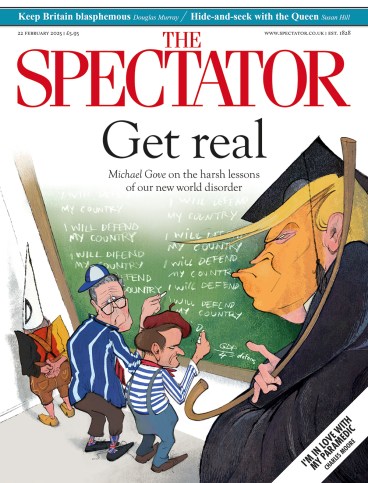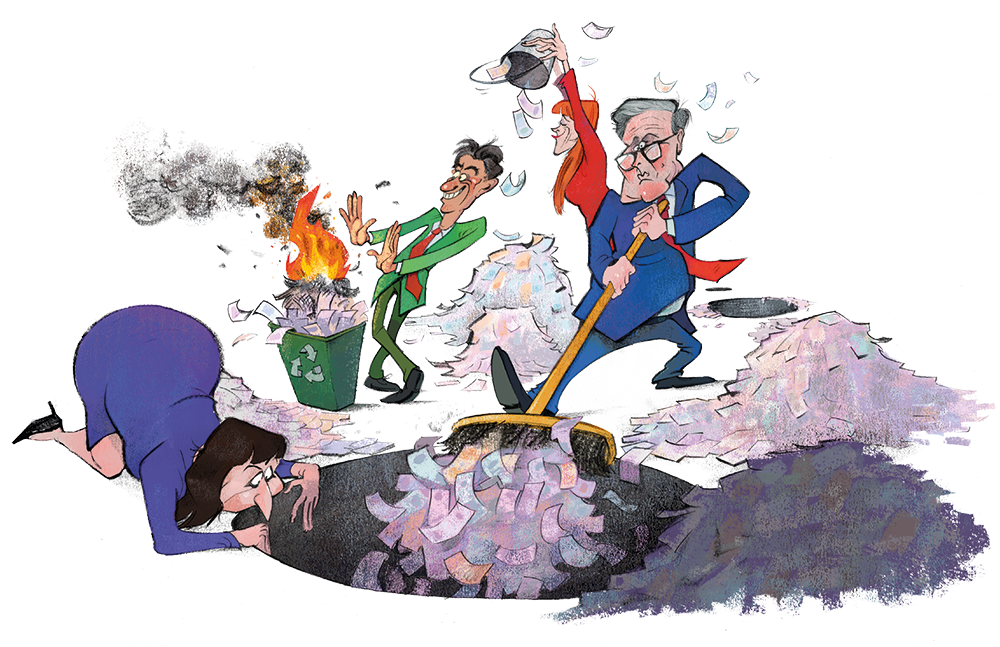
Wonderfully useless
Sir: Michael Simmons overlooks some scandalous examples of frivolous funding right under his nose (‘Waste land’, 15 February). A few minutes from our offices, there are several vast buildings, all lavishly subsidised by the taxpayer, whose sole purpose is to allow hordes of strangers to stare at rectangular sheets of fabric on which are daubed various colours and shapes – most of which quite wastefully replicate things that we can already see with our own eyes in the real world. Across the river, many millions more are spent on small armies of people coming together to bang, scrape and blow bits of wood, metal and brass for hours on end so that other people can sit and listen to them for no other reason than – brace yourselves, Spaffers – to enjoy themselves.
The arts are, by definition, frivolous. That is their gift: they carve out a space for us in which the demand for utility – which weighs down on so much of the rest of our lives – is suspended. Beethoven’s late string quartets, the paintings of Manet, the films of Andrei Tarkovsky – all quite useless! And yet it is this very quality, their total, majestic uselessness, that makes great art so unassailably useful. The Arts Council-funded projects that Simmons lists in his piece are indeed risible. But they’re risible not because they are frivolous, but because they are not frivolous enough. The reason why we’re in a place where plays ‘about Brexit’ and festivals ‘about sustainability’ are being funded by the Arts Council is precisely because of articles that demand that art becomes ‘less frivolous’, more ‘relevant’, more ‘useful’.
Art can of course exit this squalid little game of having to justify its ‘use’ to the public by refusing public subsidy. But if you believe in public subsidy for the arts at all, demanding the elimination of the frivolous from arts funding is tantamount to a declaration of war on art itself – and thus also on my pages.
Igor Toronyi-Lalic
Arts editor, The Spectator, London SW1
My British pride
Sir: Douglas Murray (‘Pride in Britain? It’s history’, 15 February) suggests that those who settle in our country with citizenship are unable to take the same pride in Britain as someone whose family has been here since time immemorial. I wholeheartedly disagree. My father came to this country – from Pakistan, no less – in 1972. He’s never been back. He speaks proudly of British history, British success in conflicts, and yearns for the return of the royal yacht Britannia. He’s had successful businesses and been a member of the Conservative party for decades. Now I am proud to represent the party. I suspect Douglas Murray misses the fact that it isn’t about where people come from, but about who we allow to settle here. Many from Pakistan and elsewhere won’t share British values. Do we want those people to settle? I don’t think so. Being British is a privilege, not a right. This is something Kemi Badenoch has spoken about and I hope she will address.
Cllr Nadim Muslim
Bolton, Lancashire
Airey promises
Sir: Is Kemi Badenoch right to make a hero of Airey Neave (Politics,15 February)? His wartime bravery and skill as an intelligence officer should always command unstinting admiration. Political dissimulation, at which Neave excelled (as he showed during the Thatcher leadership campaign), is a quality every successful leader needs, as long as it is deployed with care and thought. But he was never remotely interested in political ideas. He supported Margaret Thatcher to the hilt without ever engaging in economic or social arguments, and was handicapped by being acutely sensitive to media criticism, which irritated his colleagues.
After 1975, he largely confined himself to his shadow cabinet responsibilities for Northern Ireland, but in calling for tough new measures against the IRA he was rather overshadowed by Labour’s pugnacious Northern Ireland Secretary, Roy Mason, who implemented them. Neave formulated a plan to make Northern Ireland’s place in the United Kingdom much stronger, but after his murder in 1979 Mrs Thatcher ditched the policy in favour of power-sharing between Unionist and Nationalist parties, which Ted Heath had introduced and which has carried the day ever since. It is hard to see how Airey Neave’s work can greatly assist Mrs Badenoch’s success.
Alistair Lexden
(Adviser to Airey Neave 1977-79)
House of Lords, London SW1
View from the pew
Sir: I find it regrettable that Charles Moore (Notes, 15 February) seems to propose the Bishop of Norwich as a possible candidate to replace Justin Welby. Some years ago, when I lived in Norfolk, I had a letter published in the Eastern Daily Press in which I objected to the Bishop’s plans to amalgamate numerous parishes. My parish priest told me that the bishop had asked him: ‘What is her standing?’ As I merely attended church my views were clearly of no importance to him. Our institutions ignore their bedrock supporters to their detriment.
Jane Moth
Stone, Staffordshire
Bring back Rafferty
Sir: I agree with my former boss Charles Moore’s piece about the demise of Radio 3 (Notes, 8 February). Another of the BBC’s ‘If it ain’t broke, fix it’ mistakes. There is, however, a major omission in his piece. The long-standing jewel in Radio 3’s crown was its unparalleled broadcaster Sean Rafferty, the voice of In Tune. Was it ageism that made the controller of Radio 3 lose Sean Rafferty and gain a presenter who appears to think the slot should be a jolly chat in which to flatter and giggle? Rafferty talked with understanding and knowledge of music and musicians. This was never more evident than in his last broadcast just before Christmas, when we listeners learnt it was to be his last. Now I switch off at 5 p.m.
Tamasin Day-Lewis
Somerset







Comments